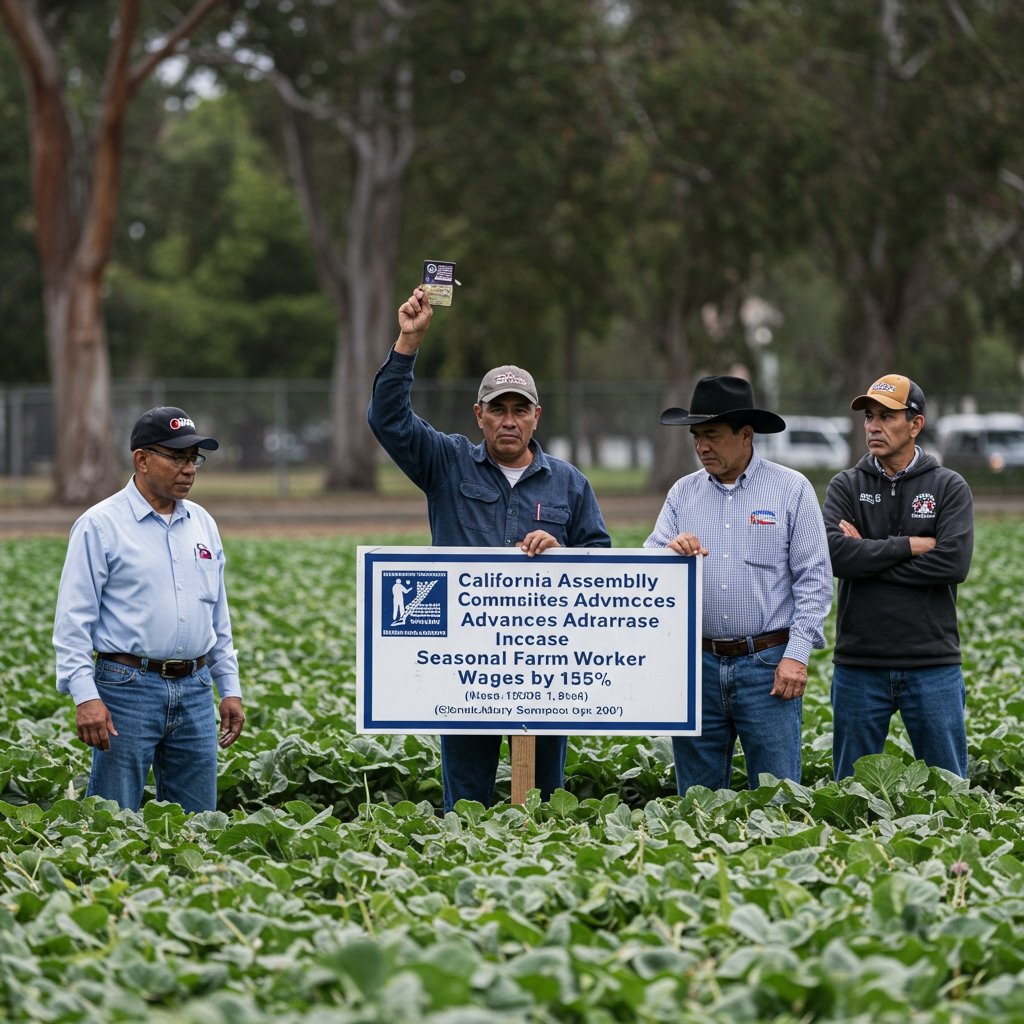California Assembly Committee Approves Bill Mandating Phased Wage Increase for Seasonal Farm Workers
SACRAMENTO, CA – In a significant move for California’s vast agricultural sector and its workforce, the California Assembly Committee on Agriculture today voted to advance Assembly Bill 123. The proposed legislation, sponsored by Assemblymember Elena Rodriguez, seeks to implement a phased increase in wages for seasonal agricultural workers across the state.
AB 123 mandates a 15% wage increase for seasonal farm laborers, to be rolled out gradually over the next three years. The phased increase is set to commence on January 1, 2026. Proponents argue the measure is a necessary step towards providing fair compensation and improving the living standards of these essential workers who are the backbone of California’s produce industry.
Industry Concerns Over Rising Costs and Competitiveness
The passage of AB 123 through the Assembly Agriculture Committee was met with strong opposition from representatives of the state’s agricultural industry. Among the most vocal critics was the California Farm Bureau Federation. Industry spokespersons raised concerns that the mandated wage hike would significantly increase operational costs for growers and farmers already grappling with tight margins, regulatory burdens, and unpredictable market conditions.
Opposition arguments centered on the potential for California-based growers to lose competitiveness in global and domestic markets. They contend that increased labor costs could make California produce more expensive relative to produce grown in other states or countries where labor costs are lower. This, they warn, could lead to reduced demand, financial strain on farms, and potentially force some smaller operations out of business.
Advocacy Groups Hail Progress Towards Fairer Wages
Conversely, labor advocates and worker representation groups lauded the committee’s decision. The United Farm Workers (UFW) union was prominent among those celebrating the bill’s advancement. The UFW characterized AB 123 as a crucial step towards achieving fair compensation and dignity for seasonal farm workers, many of whom earn low wages and face challenging working conditions.
The union emphasized the vital role seasonal agricultural workers play in the state’s economy and food supply chain, highlighting the physical demands of their labor and the often-precarious nature of their employment. They argue that a mandated wage increase is long overdue and essential for enabling workers to better support themselves and their families, addressing issues of poverty and food insecurity within farmworker communities.
Economic Projections and Potential Consumer Impact
Economic analysts have begun to project the potential broader impacts of AB 123, should it ultimately be signed into law. Initial assessments suggest that the bill could result in a modest increase in retail prices for affected produce items.
Projections indicate that consumers might see a price increase of between 3% and 7% for specific fruits, vegetables, and other agricultural products within approximately 18 months of the wage increase taking full effect. This anticipated increase is attributed to growers passing on a portion of their higher labor costs to distributors and retailers, who in turn may pass those costs onto consumers. The exact impact would likely vary depending on the commodity, market dynamics, and the ability of growers to absorb some of the increased expenses through efficiency gains or other means.
Context: Seasonal Farm Labor in California
California relies heavily on seasonal agricultural workers to plant, cultivate, and harvest a vast array of crops that feed the nation and the world. These workers often migrate throughout the state or the country following harvest seasons, facing challenges such as unstable income, lack of affordable housing, and limited access to healthcare. While minimum wage laws apply, much of seasonal farm work is compensated based on piece rates, which can fluctuate based on yield and market conditions. Advocates argue that even with minimum wage protections, the income earned is often insufficient to meet the high cost of living in many parts of California.
AB 123 aims to directly address the baseline compensation for these workers, ensuring a scheduled increase beyond existing wage floors.
The Legislative Path Forward
The approval by the Assembly Committee on Agriculture marks an important milestone for AB 123, but it is just one step in a lengthy legislative process. The bill must now be considered by other relevant Assembly committees, potentially including the Appropriations Committee due to its potential fiscal impact. If it successfully passes through committees, it would then proceed to a vote on the full Assembly floor.
Should the bill gain approval from the Assembly, it would then move to the California State Senate, where it would undergo a similar committee review and floor vote process. If both the Assembly and Senate pass the bill without amendments, it would be sent to the Governor’s desk for signature or veto. If amendments are made by either house, the bill would need to go back to the other house for concurrence or proceed to a conference committee to reconcile differences.
Supporters remain optimistic about the bill’s chances, framing it as an issue of equity and economic justice. Opponents, however, are expected to continue lobbying against the measure, emphasizing potential negative consequences for the state’s vital agricultural economy and ultimately, food production and costs.
The debate surrounding AB 123 highlights the ongoing tension between ensuring fair treatment and compensation for agricultural workers and maintaining the economic viability and competitiveness of California’s agriculture industry. All eyes will now be on the next stages of the legislative process as the bill makes its way through the State Capitol.



















